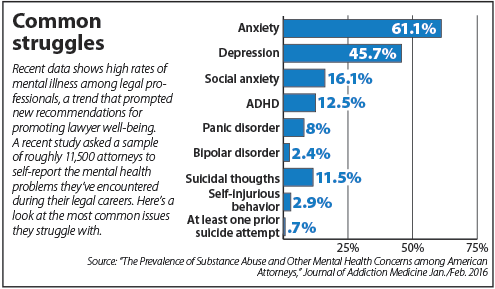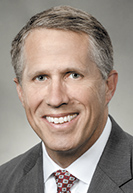Subscriber Benefit
As a subscriber you can listen to articles at work, in the car, or while you work out. Subscribe NowAcross the United States, nearly half of all legal professionals report experiencing depression at some point in their careers. More than half say they have struggled with anxiety.
Those findings, released as part of a 2016 study from the Hazelden Betty Ford Foundation and the American Bar Association Commission on Lawyer Assistance Programs, prompted the ABA’s National Task Force on Lawyer Well-Being to consider how the culture of the legal profession must change to promote mental health. The result was “The Path to Lawyer Well-Being: Practical Recommendations for Positive Change,” a 73-page report that offers dozens of recommendations to treat and prevent mental health problems among law students, attorneys and judges.
 Harrell
HarrellTerry Harrell, executive director of the Indiana Supreme Court Judges and Lawyers Assistance Program and member of the task force, said the goal of the 44-recommendation report is to start a movement that will cause legal professionals to understand the role they can play in supporting well-being among their colleagues. The recommendations apply to various stakeholders within the profession — such as law schools, employers, bar associations — and the individuals who make up each of those groups. These groups need to contribute to the push for greater awareness of mental health needs, Harrell said.
“JLAP alone can’t do that,” she said.
Change in firm culture
Among the stakeholders addressed in the task force’s report are legal employers, which include law firms and judicial offices. The report calls on employers to not only monitor their attorneys for signs of mental distress, but also to take active steps to promote prevention and treatment.
One way to create a healthy firm culture is to launch a firm-wide lawyer well-being committee, the report says. In Indiana, some larger firms have implemented programs that incentivize healthy attorney lifestyles, though such programs tend to focus on physical, rather than mental, well-being, Harrell said.
But at Lewis Wagner, both mental and physical health are a priority for the firm’s Living Well program. That program, run by resources manager Laura Rust, offers an annual Wellness Day when firm attorneys can participate in health screenings and take advantage of on-site massage therapists who are available free of charge. The firm also brings in the massage therapists every two weeks for a fee, making them available year-round to help attorneys relieve stress-related tension.
 Harrell said her goal is to encourage other legal employers to engage in similar efforts and to partner with JLAP to offer programming that will make attorneys aware of the importance of their mental health. The Indiana State Bar Association is also involved in those efforts through its Wellness Committee, which offered four mental health-related programs this year, committee chair Patricia McKinnon said. Those programs included webinars that allowed attorneys to share their mental struggles without the eyes of their colleagues directly upon them, thus promoting a more open dialogue about mental health, McKinnon said.
Harrell said her goal is to encourage other legal employers to engage in similar efforts and to partner with JLAP to offer programming that will make attorneys aware of the importance of their mental health. The Indiana State Bar Association is also involved in those efforts through its Wellness Committee, which offered four mental health-related programs this year, committee chair Patricia McKinnon said. Those programs included webinars that allowed attorneys to share their mental struggles without the eyes of their colleagues directly upon them, thus promoting a more open dialogue about mental health, McKinnon said.
The report also encourages all stakeholders to consider changing the profession’s culture regarding alcohol. Many after-hours events sponsored by legal groups offer a social hour that includes alcohol, but Harrell said such events can be difficult for attorneys who are struggling with or recovering from addiction.
While neither the report nor Harrell condemn social drinking, they do caution against creating a culture in which consuming alcohol is expected. There are a variety of reasons an attorney might not be able to drink, including addiction, depression and other health issues, but abstaining from imbibing is often viewed as an exception to the norm, she said.
Attorneys who choose not to drink may feel left out, and they may even choose to drink to conform to social pressure.
What about the judges?
While conversations surrounding well-being in the legal profession often address lawyers’ mental health needs, the report indicates judges deal with the same issues, yet are seldom asked about those issues. Most data surrounding judges’ well-being is anecdotal, Harrell said, and the report calls for a study to be conducted into judges’ mental health.
 Baker
BakerDespite the current lack of empirical data, the task force’s report suggests there is one mental health issue among judges that is already well-known: isolation. Magistrate Judge Tim Baker of the U.S. District Court for the Southern District of Indiana sits on the Indiana JLAP committee. He said feelings of isolation often come as a result of being separated from colleagues who judges frequently associated with while they were working as attorneys. Becoming a judge changes the nature of those relationships, Baker said.
Further, the type of work judges do often causes high levels of stress. Trial court judges, for example, are frequently tasked with resolving child abuse or lengthy criminal cases that expose them to the worst parts of human nature, which can take a mental toll, Harrell said. And in federal courts, judges can have very busy dockets that involve complex cases, which creates stress as they try to keep up, Baker said.
At the state level, JLAP offers various forms of assistance to judges who find themselves struggling with a mental illness. For example, the organization presents at judicial conferences on topics such as suicide prevention and compassion fatigue, which is a weakened mental state caused by being frequently concerned with the well-being of others.
Additionally, JLAP offers judicial roundtables with small groups of judges who can discuss their job-related stress. Those discussions help combat feelings of isolation by showing judges there are other people who are also dealing with the same kind of stress and anxiety, Harrell said.
Baker is also involved in the push for judicial mental health awareness on the federal level, using his position as the magistrate representative on the Federal Judicial Center’s advisory board to travel the country and teach judges to recognize the signs of a mental health problem. Baker’s presentations address signs of alcohol and other substance abuse and point to resources that can help on the road to recovery.
The task force’s report also calls on judges to recognize and respond to signs of mental illness in the attorneys who come before them. Baker agreed with that recommendation and said his presentations are also meant to make judges aware of behaviors that could indicate a mental health problem.
For example, if a judge notices an attorney is frequently arriving late to court or missing hearings, that could be a sign the attorney is dealing with a hidden mental illness, such as depression or a substance abuse problem, Baker said. The report encourages judges to be aware of the mental health resources available in their state so they can point struggling attorneys toward options for help.
Though no judge or attorney can play a role in each of the 44 recommendations included in the task force’s report, every legal professional can learn to recognize the signs that indicate a colleague may not be functioning at their best, Harrell said. Understanding those signs can shift the culture in the legal profession from one that encourages attorneys to hide their problems to one that champions treatment and prevention, she said.
“Everyone has a piece in this,” Harrell said.•
Please enable JavaScript to view this content.
